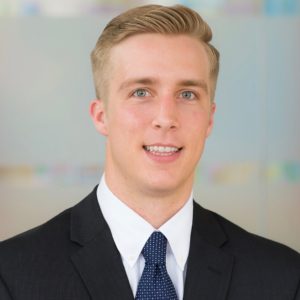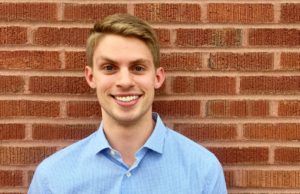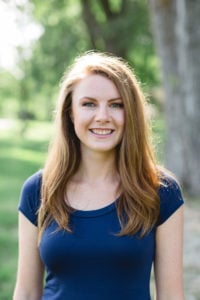Stanford’s USA MBA Fellowship pays for a Graduate School of Business student’s tuition for two years if they return to the Midwest for two years to work after completing their studies. The fellowship also requires each fellow to have a strong connection to the Midwest before applying. The first fellows, Adam Verhasselt, Taylor Seabaugh and Amanda Donohue-Hansen share their past experiences in the region and what the fellowship means to them.
Adam Verhasselt MBA ’19

Due to traveling, these answers were given by Verhasselt through email.
TSD: Why did you decide to apply for the fellowship?
AV: My strong ties to the Midwest region and desire to return upon graduation made me eager to apply to the Stanford USA MBA Fellowship. When I first visited campus, I quickly knew that I wanted to join the GSB community. The campus is scenic. The academic program is challenging and flexible. And most importantly, the people are incredible. The community at Stanford places tremendous value on collaboration and fostering lifelong relationships, well aligned with my Midwestern roots. I couldn’t be more thrilled to join the GSB.
TSD: What was your prior connection to the Midwest, and in which region/state?
AV: I proudly grew up on a dairy farm in Freedom, Wisconsin, a hardworking 5,842 person community located 20 miles south of Green Bay. I attended the University of Wisconsin for my undergraduate degree alongside my siblings, who are triplets, and then spent three years in Wells Fargo’s middle market bank where I learned about a wide array of industrial businesses.
TSD: Do you think that the fellowship can succeed in its desire to contribute to the economic development of the Midwest? How?
AV: Significant contributions always require more than just one person, so it’s ultimately up to us to work alongside and empower others to drive transformational progress. With that said, I’m confident that the GSB’s commitment to the Midwest through the fellowship is a great mechanism to promote awareness about the unique opportunities in the region and to encourage others to return as well to make their own impact.
Taylor Seabaugh MBA ’19

TSD: Why did you decide to apply for the fellowship?
TS: The fellowship is an incredible opportunity. I was very interested in Stanford but then the fellowship was just an additional motivator. On a professional level it allows me to pursue my entrepreneurial aspirations without the pressures of student debt pushing me towards a less financially risky career path, but more importantly, in time I get to give back to the Midwest communities that have supported my personal and professional growth throughout the last 26 years.
TSD: Do you have plans yet for what you will be doing in the Midwest during the two years after graduation that you’ll be living and working there?
TS: My background is in chemical engineering and product development, and I want to build on that background to create a materials-based company headquartered in the Midwest. By locating my company in the Midwest, I hope to bring financial capital and jobs to the region. That’s my intention: to start a company in the area. At this point, the GSB is an opportunity for me to flesh out a business concept. I hope to develop a concept through the GSB coursework as well as [collaborating] with students across campus.
TSD: What does the fellowship mean to you personally?
TS: The Midwest is where I’m from: it’s my home, so going back is great. All of the people that have supported me throughout my development both growing up and professionally–my family, my friends, teachers, coworkers and mentors–are all from the Midwest [with the exception of those from Cornell]. I’m really grateful for the resources they’ve put towards my development, and I hope I can pay that kindness forward to the region.
Amanda Donohue-Hansen MBA ’19

TSD: Why did you decide to apply for the fellowship?
ADH: Professionally, it’s really well-aligned with my goals. The food and agriculture industry in North America [is] really rooted in the Midwest, so professionally, it’s just really aligned with where my career is. Personally, I have been living in Minnesota my entire adult life for over 10 years now, so I have a number of very close friends and personal/professional relationships here. I’m just excited to have an opportunity to come back to my adopted home state.
TSD: What did you mainly write about in your application essay?
ADH: When I first moved [to Minnesota], so many people would say, ‘Why would a native Californian come to Minnesota? How do you survive the winters? What are you doing here and what is your plan?’ To this day I still get [those questions]. I have to explain myself and my career. I’ve spent time in both [Minnesota and California,] and I’ve taken advantage of the opportunities and my background in California, but I’ve really made a home for myself and am really passionate about the food and agriculture sector and the community of Minnesota. I’m looking forward to the day where I’m never quite asked those questions, that people just really understand me and my passions and why I’m here.
TSD: How do you think the program can succeed in bringing economic growth to the Midwest?
ADH: There’s a few ways. One way that comes to mind is just really around talent development and talent critical mass. I have seen firsthand a number of my friends get amazing and ridiculous salary relocation offers to the Bay Area. I’ve seen various talent going to the west coast. Over time, this fellowship will start to have a class [of alumni] and a stronger community. It won’t be long from now where there’s gonna be 20 of us that could be in the midwest over five or six years. Not only will we be able to maybe be a small reversal of that trend with talent leaving the Midwest, but I also think by creating that critical mass, others may also follow because they won’t feel so alone or without support should they choose to pursue a career or pathway in this economy.
These transcripts have been lightly edited and condensed.
Contact ZaZu Lippert at zazulippert ‘at’ gmail.com.